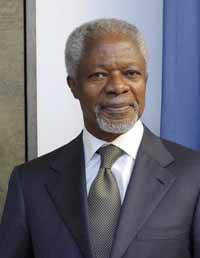
Source: https://www.un.org/sg/en/content/kofi-annan
Former 7th UN Secretary-General Kofi Annan died of illness in hospital in Bern, Switzerland at the age of 80 on 18 August 2018 with his wife, Nane, and three children Ama, Kojo and Nina, by his side.
Born in Kumasi, Ghana on 8 April 1938, Annan joined the United Nations (UN) system as early as in 1962 and served as the administrative and budgetary officer of the World Health Organization (WHO). He subsequently served under different organization under UN such as the Economic Commission for Africa in Addis Ababa, the UN Emergency Force in Ismailia, the UN high commissioner for refugees in Geneva as well as in several senior posts at its headquarters in New York dealing with human resources, budget, finance, and staff security. Besides, he was under-secretary general for peacekeeping missions and also served as special representative of the secretary general to the former Yugoslavia between 1995 and 1996.
On 1 January 1997, he became the seventh UN Secretary-General. He was the first black secretary-general since the founding of the United Nations in 1945. He was re-elected in 2001. He began his second term in 2002 and retired on 31 December 2006.
During his tenure as the UN Secretary-General, Annan pushed for several reforms to ‘re-energize the UN. He issued a proposal to “revitalize the United Nations” to reshape the UN as the authority of the largest international organization. Besides, Annan also engaged in several mediations such as the Palestinian-Israeli conflict, and the Afghan crisis.
In April 2000, Annan published the “Millennium Report” under the title “Our People: The Role of the United Nations in the Twenty-First Century”, calling on Member States to devote themselves to an action plan to eradicate poverty and inequality and improve education. Reduce HIV/AIDS, protect the environment and protect people from deadly conflicts and riots.
The report later became the basis of the Millennium Declaration adopted by heads of State and Government at the Millennium Summit held at United Nations Headquarters in September 2000.
In April 2001, Annan published a five-point “call to action” to address the HIV/AIDS epidemic, which he called “personal priorities,” and proposed the establishment of a global health fund to help developing countries in crisis.
On 12 October 2001, the Norwegian Nobel Committee announced that the United Nations and UN Secretary-General Kofi Annan shared the 2001 Nobel Peace Prize in recognition of his efforts to reform this international organization.
However, the US-led multinational coalition forces invaded Iraq in 2003, casting a shadow over Annan’s second term.
In the last years of his life, Annan worked in Switzerland and presided over the work of the Annan Foundation at the United Nations Headquarters in Geneva.
In 2006, South Korea’s Ban Ki-moon succeeded Annan as the UN Secretary-General. After leaving office, Annan established the Kofi Annan Foundation to continue to assist developing countries and improve world agricultural production (https://www.kofiannanfoundation.org/)
In fact, after Annan retired from the United Nations, he still works tirelessly by holding a number of major diplomatic positions, including accepting the United Nations and the Arab League as special envoys in 2012 to try to resolve the long-standing Syrian civil war. In 2016, Annan was commissioned by Myanmar’s state-owned Aung San Suu Kyi to lead an independent committee to investigate the Rohingya Muslim crisis.
Mr Annan, thank you for your great advocacy for Peace in this world. You have left our world a better place to live. May his soul rest in peace.
Categories: International Relations




